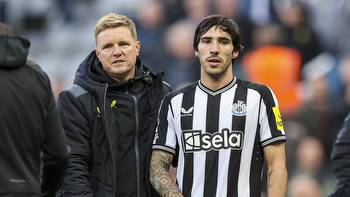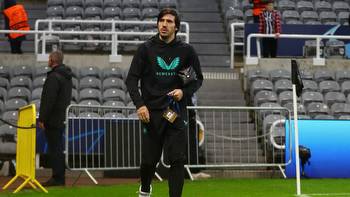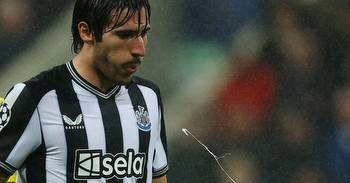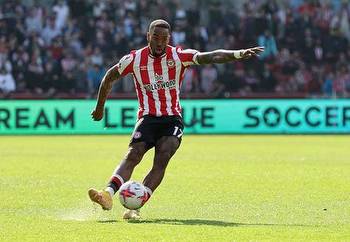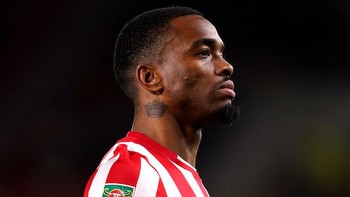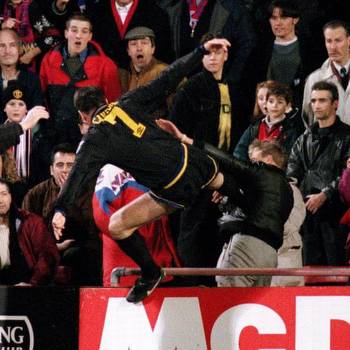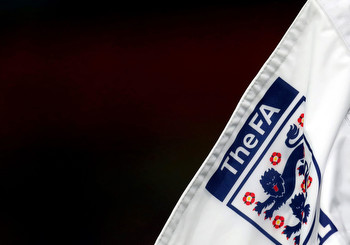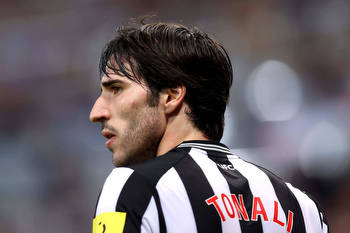Tonali, Toney, Toffolo: How betting bans are decided and why they vary so much

Sandro Tonali’s mistakes mean he will play no further part in Newcastle United’s season, nor will he be available for Italy if they qualify for next summer’s European Championship. A 10-month suspension, handed out by the Italian Football Federation (FIGC), means the midfielder is ineligible for club and country until August.
Tonali learned his punishment for multiple betting breaches in his native Italy and, like international team-mate Nicolo Fagioli, there was a price to pay for his indiscretions. A season lost and a reputation tarnished.
The suspension might have been worse had it not been for his cooperation and the acceptance of a gambling addiction. Both were mitigating factors in shaping the length of Tonali’s ban but the high-profile episode could never end without punishment. Not when he had been found to have placed bets on games involving his then-team AC Milan.
Tonali becomes the second Premier League player suspended for betting breaches after Brentford’s Ivan Toney was given a lengthy ban by the English Football Association in May. The England striker will not be available again until January 16 after he accepted 232 breaches of the FA’s betting regulations. He was given an eight-month penalty after 29 bets were placed on clubs Toney had either been registered with or on loan at.
Yet dotted around the cases of Tonali and Toney are others where breaches of gambling guidelines have ended without the same level of punishment. Chris Maguire, the former Sunderland and Lincoln City forward, was given only a six-week ban in January for multiple breaches, and Nottingham Forest midfielder Harry Toffolo escaped with just a warning and a fine of almost £21,000 ($25,000) after accepting a charge for betting on matches in which he had played.
What appear to be inconsistencies, though, are only part of a nuanced process that sees players brought to task for breaches of the FA’s Rule E8. Tonali’s punishment has been decided by the Italian FA but the same factors — both aggravating and mitigating — are considered when the length of suspension is determined.
“No case is going to be exactly the same,” says Stephen Taylor Heath, head of sports law at JMW Solicitors. “There are going to be different nuances in each one that have to be dealt with at the point of sanction.
“There might seem to be a little bit of inconsistency from the public side but from a legal perspective, the process is reasonably transparent.”
Professional footballers, management and staff cannot place bets on football matches. A breach of those rules, designed to retain integrity, falls broadly into one of four categories; betting on any football match in the world, betting on a competition in which you are involved, betting on a match involving your own team and, most seriously, betting on a particular occurrence involving that individual. Each of those categories brings the outline of a sporting sanction before the case is made for either a reduction or extension of that ban.
Tonali, Toney and Toffolo were all guilty to varying degrees, with each accepting the charges levelled against them. Yet, unlike Tonali and Toney, Toffolo avoided a suspension. Toffolo’s deteriorating mental health was considered to be a “very substantial mitigation” for his breaches by an independent commission.
“Comparing Ivan Toney and Harry Toffolo’s actions can illustrate an important point,” says Dan Chapman, head of sports and employment teams at Leathes Prior. “At first glance, you ask how has one player been banned for a very significant period and the other hasn’t.
“In the UK, there is a list of factors that are considered to be mitigating and also various factors that are considered to be aggravating. When they’re looking at any length of ban, they’ve got to weigh up the two sides.
“In Toffolo’s case, there were lots of mitigating factors that they identified and a big factor is the extent to which the player admits the charge and how they cooperate.
“The FA pays a lot of attention to how a player responds and if you read the decision in Harry Toffolo’s case, he got a lot of credit for the fact he admitted it and gave full disclosure to the investigation.
“Other players have been a little bit evasive in the beginning, trying to argue it wasn’t their account, it wasn’t their phone. With Toney, for example, he hadn’t been too forthcoming initially in the process.”
Accepting culpability and cooperating has helped Tonali avoid a longer suspension than the 10 months he must serve, as has the admission of a gambling addiction and the subsequent willingness to seek help. Toney, too, was told the FA would have pushed for a 15-month suspension had he not pleaded guilty to his 232 breaches.
The English FA outlines 10 factors that it will consider when deciding upon the length of a ban, including the number and size of bets placed, personal circumstances, the experience of the individual and assistance offered to the disciplinary process. Whether the player has featured in games that they have placed bets on is another key aspect.
“The appropriate sanction is very much left to the discretion of the commission and will be dependent on the facts of the individual case,” says the FA.
That is why Toffolo, whose 375 breaches included 40 bets involving his own team, was spared. He had gone six years without betting and began gambling on football matches when still a teenager. Among total bets of £1,323.92, he had bet 25p on himself being the first and last goalscorer in the 2015 League One play-off final when still with Lincoln City. It was said he had shown “genuine remorse”.
“You might find it a surprise when you hear Toffolo wasn’t banned but there were a lot of factors that would have meant a ban would seem harsh,” says Chapman.
“By the time they’d charged Toffolo, he hadn’t placed a bet for six years or so. He had already fixed himself and turned things around.”
Toney’s case had differences. His most recent offences had come in 2021 after starting four years earlier and he would later accept that he had lied to investigators when initially denying he had bet on football. Toney was also found to have placed 13 bets on his own team to lose in seven different matches. A guilty plea and the acceptance of a gambling addiction reduced the ban but avoiding a suspension altogether was made impossible.
“There are shades of grey in relation to a player’s conduct in admitting the offences,” adds Taylor Heath. “He might dispute the facts and might not be entirely cooperative with the FA when they’re investigating.
“If you look at the Toney case, for example, the FA argued he shouldn’t be given the full credit. If one player is considered to be entirely cooperative, like Toffolo, and another isn’t, then you’re going to have an immediate difference in the length of a ban.
“There’s potential for reducing the ban further depending on the circumstances that surround the matter. One mitigating factor, for example, is the admission of a gambling problem and whether the person is receiving treatment for that. If they are, it mitigates the possibility of further offending.
“They are all things that have to be taken into consideration and, as a result of that, you can get differing sanctions. It’s not possible to throw a collective blanket over them all and then ask why betting judgements are so different.”
There are those below the English Football League (EFL) who have been hit with more draconian punishments in 2023.
For example, Dean Snedker, a journeyman non-League goalkeeper once of Northampton Town, was charged with 503 breaches of the FA’s betting rules between 2015-16 and 2021-22, a period that included stints playing for Kidderminster Harriers, Cambridge City and St Albans City.
Snedker, an investigation found, had staked £42,708 in bets, including 11 bets on games that involved his own team. The FA accepted that there had been no evidence to suggest Snedker had influenced the outcome of those games but a dim view was taken by an independent panel.
“The reality is that Mr Snedker knew what he was doing, and knew that that behaviour was contrary to the regulations,” it was said at his hearing held two months ago.
Snedker was banned from all football-related activity for four years, with two of those suspended.
That case followed that of Nathan Hicks in June, another non-League player the FA had banned for betting breaches. Hicks, formerly of Kettering Town and Rushden & Diamonds, was found to have breached betting regulations 2,753 times between 2017 and 2022, staking more than £122,000 in total.
Included in his charge sheet were the 15 occasions he had bet on his side to win, as well as the 14 occasions he had backed an opponent to beat his own team. Hicks, who the FA accepted had a gambling addiction, had previously been given a warning over a betting breach in 2017 and only offered “limited assistance” to the FA’s latest case against him. Hicks was eventually banned for three years, with a further two years suspended. He cannot play football again until the summer of 2026 at the earliest.
Go further back and the broad range of betting suspensions is just as clear. Joey Barton’s playing career was effectively ended by an 18-month ban he received, aged 34, having placed 1,260 bets on football matches between 2006 and 2013, while Andros Townsend was suspended for four months in 2013 when, as a youngster with Tottenham Hotspur, he admitted betting on televised matches. Manchester City’s Martin Demichelis, meanwhile, escaped a ban in 2015 after placing 25 bets in the space of three weeks.
Kieran Trippier and Daniel Sturridge. Tripper was banned for 10 weeks and fined £70,000 after the FA charged him with passing on information not publicly available to be used by others for betting when he left Tottenham Hotspur to join Atletico Madrid in 2019.
Sturridge was found guilty of the same offence and had an initial six-week ban increased to four months after the FA appealed the original verdict. He was found guilty of providing his brother with inside information on a potential move from Liverpool to Sevilla in 2018.
Both those cases, though, brought an important distinction. Bans issued by one FA bring worldwide suspensions through FIFA, preventing a player from moving country to find a fresh start. Tonali has all doors closed as he begins a 10-month countdown to returning.








